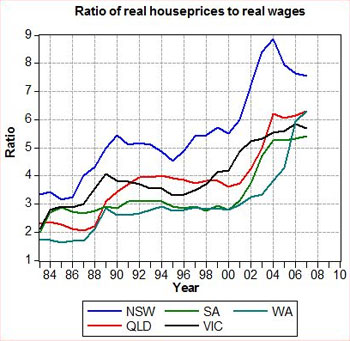At some point we will have to stop blaming John Winston Howard for every problem we face. For the moment, though, it does seem that whenever we lift the lid on some important issue we find something smelly whose cause was inaction or ineptitude on JHo’s watch.

Yesterday it was how we’re stuck with the Super Hornets thanks to “a lack of sound, long-term… planning decisions by the former Government over the course of the last decade”. Today let’s look at Chairman Rudd’s theme of the week, housing affordability.
It’s now more expensive to live in Sydney than in New York.
[P]roperty prices have jumped 400 per cent since 1986, while income has increased by only 120 per cent.
The mysterious but awesomely-brained Possum Comitatus explains how he ran the numbers, leading to this graph.
It’s worth reading the full analysis, but his conclusion is blunt:
[R]eal house prices remained virtually frozen over the period from 1990 through to 2000. It wasn’t until Howard started stuffing around with halving the capital gains rate and things like the first home buyers grant that real house prices started to accelerate…
It also highlights in real terms just how much the NSW market has dropped over the last couple of years.
Possum’s going to look at our policy options in part 2, coming soon. However The Australian‘s George Megalogenis has already started down that path — from the suitably cynical viewpoint of which options generate the most votes for whom.
Continue reading “So Howard screwed up housing affordability too”
